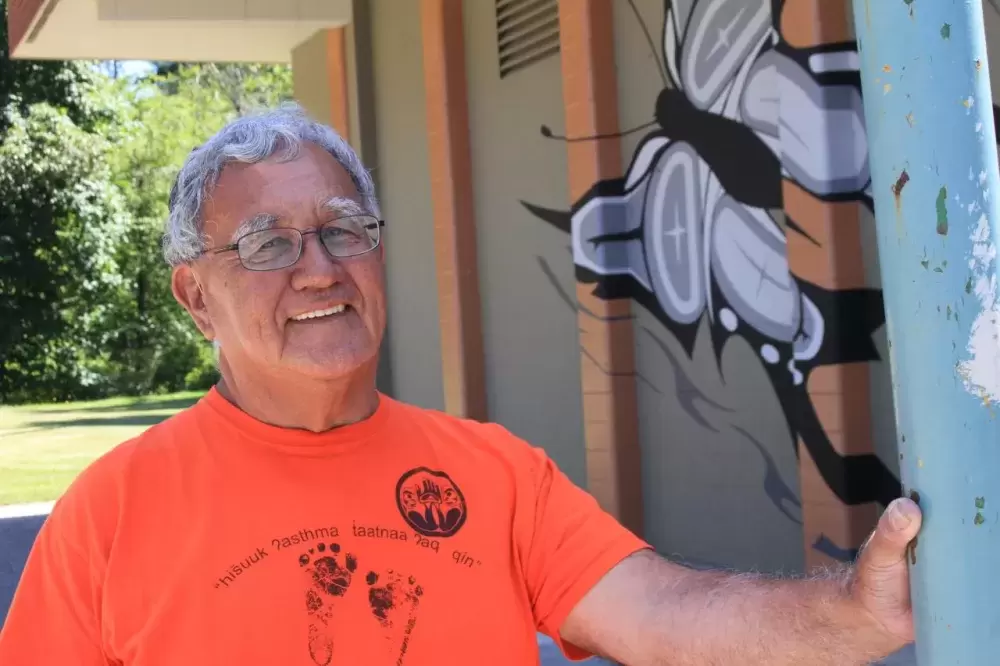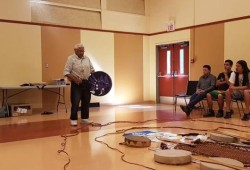Amid the darkest reaches of an individual’s suffering, relief is possible by reconnecting with our roots from birth.
This was one of the lessens given at the Quu?asa Men’s Gathering, a retreat provided June 25-27 in Port Alberni. Over the three-day session Nuu-chah-nulth participants brought their unique struggles to the Kackaamin Family Development Centre, working under the theme of using their voices to overcome pain.
“When you are born, you have everything you need to have a good life,” explained Joe Tom, a senior wellness cultural councillor with the Nuu-chah-nulth Tribal Council.
Through a series of discussions and cultural exercises that emphasized traditional teachings, participants were encouraged to transform their pain into positive energy. A person can’t change what’s happened, but he can move beyond trauma by deciding within his heart to not own the pain, explained Tom.
“I accept where I’m at - it’s okay - I can accept that, and now I’m going to let it go,” he said. “Take that energy and turn it around. What is the opposite of what happened? Begin to do that so that I can have peace in my heart. That’s the step away from your pain.”
It’s a step one participant is beginning to take as he struggles with the loss of his adult daughter just over a month ago. As a former RCMP officer of 33 years, Shamrock wonders if he could have done more for her during the years that he was focusing on helping others to change their ways.
“I was married to my job,” said Shamrock. “During my journey…I forgot to fix myself.”
Looking back over his time with the RCMP, Shamrock sees how others benefitted from his influence. But years of exposure to violent incidents left the former officer with a post-traumatic stress disorder.
“I wake up in the middle of a nightmare,” Shamrock said. “I’ve been to stabbing incidents, shooting incidents, sudden deaths, suicides.”
Over the three-day gathering he found value in praying for himself and others.
“This has brought me more spiritually grounded to who I am and where I come from,” he said, adding that this also includes his connection to his daughter. “The message that I got was, let her go…even though she’s gone physically, spiritually she’ll come back to watch over us, watch over her kids.”
Greg Louie also lost a loved one when his son passed four months ago.
“My son has gone on to the spirit world and it feels like there’s a huge gap, huge emptiness in my heart. I miss the physical-ness of my son,” said Louie, who is the Chief Councillor of the Ahousaht First Nation. “I was just a total emotional wreck. I was concerned about myself, I was concerned about my whole being. I needed to come here.”
Along with the other participants, Louie undertook a walk outside the facility on the first afternoon of the gathering. Over this exercise each man walked his own path with the intention of taking a journey from the dark world of pain to the light of recovery.
“That physical and spiritual walk I found really helpful because as I approached the area I was in so much pain, crying and grieving…it took me a while to get from the darkness, to make that walk, that transformation to the light,” he said. “For others it was quicker than me. Mine was long because I needed to feel, shout, scream, cry on certain steps of what walk.”
“Life is a journey and the elders are always saying that you learn every day,” reflected Nemook, or Thomas Paul, another Ahousaht member who participated in the men’s gathering.
Paul came to the sessions needing medicine for the pain and grief that have marked the last year of his life.
“I’ve been through a lot of places - whether it be a treatment centre or programs to heal - but having this cultural component, it opens us up,” he said. “It takes some programs so long to get people to use their voice and talk about what’s deep inside you.”
It’s been a different process than professional counselling, added Louie. Over the three days at Kackaamin he found himself transformed by being in an environment where men could open up with their vulnerabilities.
“I know men have their pain, I hear about it - but they don’t talk about it. So here the men were vulnerable and they were able to talk about their pain,” said Louie. “They talked about residential school, sexual abuse in residential school, being physically abused in residential school, physical abuse from parents, alcoholism, loss of children, loss of a mother, a father, a spouse. Using their voice, [for] some of them it was the first time to ever speak and to cry in front of men.”
The process has helped to ease suffering through prayer, connection with others and forgiveness, said Shamrock.
“Trauma starts from you, and it works its way from generation to generation,” he said. “Don’t be afraid to ask for help…If you don’t reach out you’re going to be stuck.”








